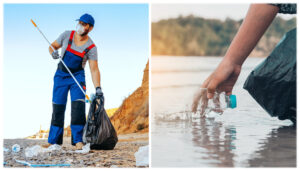We always talk about all the beautiful things to do in Hawai’i, especially in Maui, since that is where we live. Have you seen that magazine titled 101 Things To Do in Maui?
There are so many fantastic things to do on the islands that we don’t know what to do first.
Well, today, we will talk about 101 Things to Not To Do in Hawai’i – just kidding! We will talk about a few things you may not be aware of but are important things to be mindful of and be careful about.
We want all our visitors to have a safe and stellar vacation in the islands. So here are a few reminders about some things you may or may not know about. You definitely don’t want to find yourself in a challenging situation because you were uninformed about a particular protocol or law specific to Hawai’i. This could put a severe damper on your ability to really enjoy your trip.
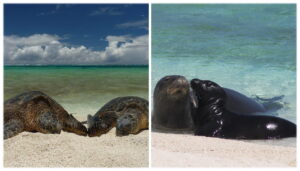
For example, did you know that it’s a felony to touch or harass a Hawaiian monk seal under state and federal laws? The penalties can include up to five years in prison and a $50,000 fine. In addition, people must remain at least 50 feet away from the adult animals or 150 feet away from pups with their mothers. Good stuff to know, yes?
So, let’s start with the rules governing our wildlife interactions. From there, we will carry on with our 11 Things to NOT Do While Vacationing in Hawai’i. Remember, you are our guest here, and it is our wish for you to have the best time ever.
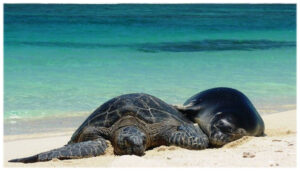
1. So, Please, DO NOT touch the turtles, dolphins, monk seals, or whales.
-
- We already talked about our monk seal, but you should know that green sea turtles are also protected. They are not shy, so please do not chase, scare, or hinder their movement. You are required to stay 20 feet from them.
- Human interaction with dolphins has been known to negatively impact dolphins, so NOAA has implemented a new rule that you cannot come closer than 50 yards to them. Otherwise, it is considered harassment under United States federal law.
- Coming closer than 300 feet to a whale is illegal. The Marine Mammal Protection Act also states anyone who harasses or disturbs them could face civil or criminal charges.
- We recognize people do not mean to harm marine animals, but they may inadvertently do so. Please do not feed or harass these marine animals for your safety and theirs.
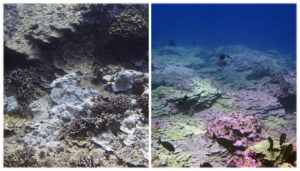
2. Keep our coral reefs alive and healthy – wear plenty of reef-safe sunscreen.
- Because of our close location to the equator, the incredible weather on Maui can sneak up on you. Especially on a cloudy, cool day. It feels like nothing can get in the way of this glorious day by the sea. But, a bad sunburn can happen quickly and ruin a few days of your trip.
- Please do your part to help protect and preserve the natural reefs and ecosystems of Hawai’i for future generations. Sunscreens that are not reef-safe have already caused so much harm to our coral reefs because of the chemicals they contain. Please avoid sunscreens containing Oxybenzone, Octinoxate, and Butylparaben.
- VERY IMPORTANT information while we are on the subject of coral. Please do not step on the coral. It kills the coral polyps that are the builders of the reef structure. If you are not the best swimmer, use a floating device under your chest to hover if you want to spend some relaxed time above the reefs or need to adjust your mask.
- Above is a photo of bleached coral on the left and recovering coral on the right. There are no fish on the bleached coral, so you can see how devastating it is.
3. Don’t move, remove, or take home lava rocks or sand
- There are tales about Madam Pele and what happened when visitors took lava rocks home. You can find out more about this HERE
- Primarily, it is illegal and highly discouraged to take lava rocks from Haleakala National Park or other areas of the island. Partly because the rocks are a part of the health of the fragile ecosystem in Hawai’i and because they are often home to native and beneficial insects that should not be disrupted.
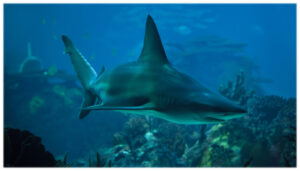
4. Do not swim in murky waters
- Although Hawaiian waters are not awash with sharks, some sharks call Hawai’i their home, so it is good to be able to see them when you are in the ocean.
- After rains or at the mouth of a river, the ocean can have low visibility. If a shark passes by, you do not want to be mistaken for a turtle.
5. Don’t rush.
- Give yourself permission to get on island time and have plenty of time so you do not get behind the wheel and drive like you are still on the mainland. You can read about soothing your soul HERE
6. The mainland is what we call the United States. We don’t call it the states as we are the 50th state.
7. The people from Hawai’i are called locals, not Hawaiians. Hawaiians are of Native Hawaiian ancestry and ethnicity.
8. Please do not disrespect the Hawaiian culture. This deep and rich culture deserves all of our respect.
- Although this seems obvious, it is good to take a moment to reflect on what it means. Of course, much of what we mentioned has fallen into this category, but there is so much more.
- The number one thing is to take care of the land since the land is the heart of Hawaiian Culture. Be mindful of the place you are visiting, as many of the people here have called it their home for generations.
- Learning proper etiquette when visiting sacred grounds is a perfect way to show respect.
- Parking anywhere you like, leaving litter, or mocking people who look different or speak differently is considered disrespect. Disrespect has a way of coming back at you.
- With simple care, attention, and a smile, you can do your part to be a good visitor and share aloha.
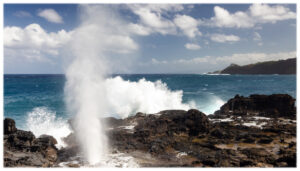
9. Don’t stand too close to a blow-hole or underestimate the power of the ocean.
- In addition, don’t dismiss the posted warning signs. They are there to prevent what has already happened too many times.
- Sometimes, the waters seem calm, but the waves can be unpredictable and deadly. So staying away from the rocky coastline during high surf is a good practice. Even the best swimmers should read and obey the warning signs!
- Blow holes are even more unpredictable than waves. Be sure to keep your distance and not think you can get in a quick photo between surges. The extreme force of the water can knock you down, wash you out to sea or suck you into the cave. This is no joke. These things have happened.
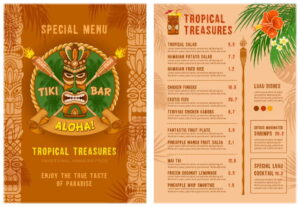
10. Don’t eat in Chain Restaurants – Try Island Cuisine
- We love the way walking into a familiar restaurant feels. You know what you want and what to expect. But what will you miss? You will miss discovering food you can’t find anywhere else. Believe me! Even when I travel, the poke (po-kay) is not the same anywhere else.
- Look for words like Hawaiian Food, Local Food, Noodles, Saimin, Fresh Fish, Lu’au, Lomilomi, Kalua Pig. Hole-in-the-Wall family restaurants can give you something special about Hawai’i. Just ask for one of the Most Popular Dishes. Read more about Local Style Food HERE.
11. Don’t sit, picnic, hang out, or nap under a Coconut Tree loaded with coconuts. If one falls on your head, your neck will never be the same.
When you grow up in Hawai’i or are a Long Time Resident, you learn these things by being here. The locals already know ALL of these things. They have heard the stories of someone paying a considerable fine for getting too close to a turtle or monk seal or, worse, losing his life from a big, unpredictable wave while fishing along the shore.
We have heard the massive THUMP as a ripe coconut hits the ground and the story about the unlucky relative who put his hammock between two coconut trees. So please, use your common sense and heed the info we have presented here. It really could save your life or that of a loved one.
Instead, focus on fun things where you are not tempting fate. Be mindful. And you will return home healthy, happy, and full of a zillion wonderful memories of paradise!
Writing and Graphic Design by Sugandha Ferro Black
Photos courtesy of paid-for or free sources unless otherwise noted.
All turtle, monk seal, title, and coral | ©CC BY-NC 2.0 Papahānaumokuākea Marine National Monument/flickr

